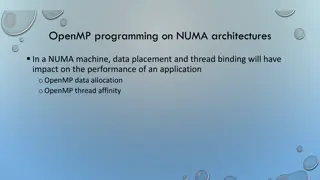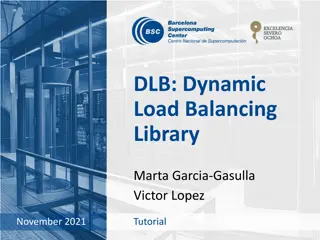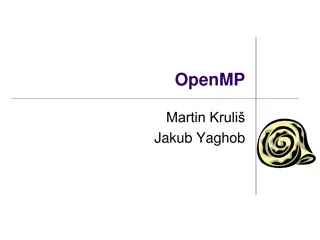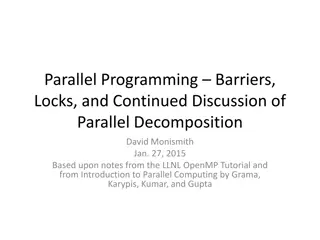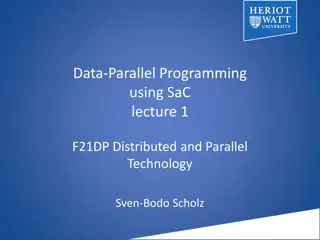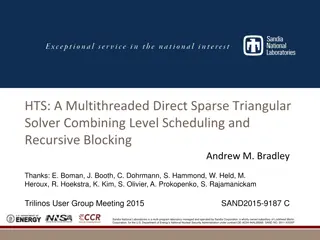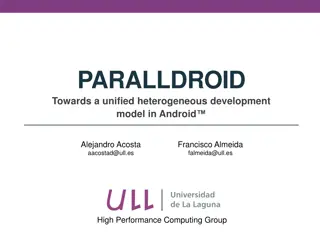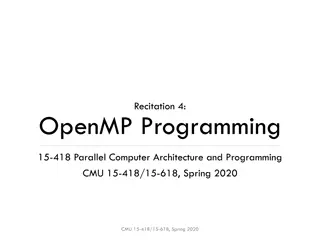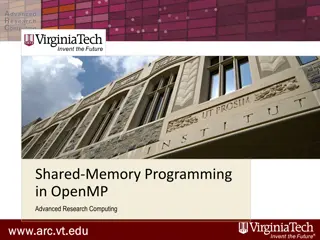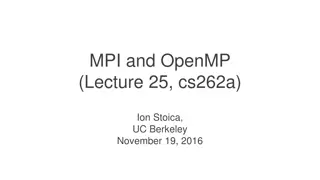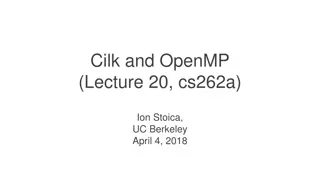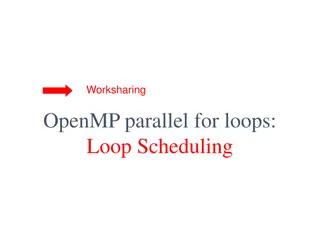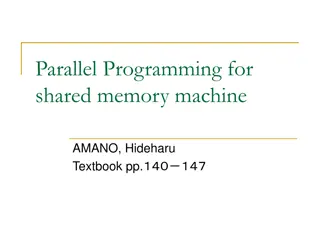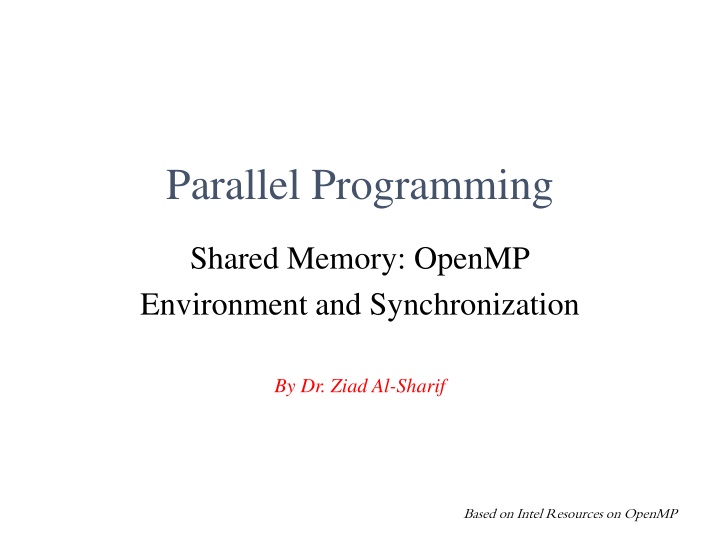
OpenMP: Shared Memory Programming in Parallel Computing
Explore the realm of OpenMP, a standard for shared memory programming, and delve into the world of parallel computing to boost performance and tackle larger problems efficiently. Learn about the API, semantics, and typical use cases of OpenMP for optimizing program execution.
Download Presentation

Please find below an Image/Link to download the presentation.
The content on the website is provided AS IS for your information and personal use only. It may not be sold, licensed, or shared on other websites without obtaining consent from the author. If you encounter any issues during the download, it is possible that the publisher has removed the file from their server.
You are allowed to download the files provided on this website for personal or commercial use, subject to the condition that they are used lawfully. All files are the property of their respective owners.
The content on the website is provided AS IS for your information and personal use only. It may not be sold, licensed, or shared on other websites without obtaining consent from the author.
E N D
Presentation Transcript
Parallel Programming Shared Memory: OpenMP Environment and Synchronization By Dr. Ziad Al-Sharif Based on Intel Resources on OpenMP
What is OpenMP? Parallel Computing gives you more performance to throw at your problems. Parallel computing is when a program uses concurrency to either: Decrease the runtime for the solution to a problem. Increase the size of the problem that can be solved OpenMP provides a standard for shared memory programming for scientific applications. Has specific support for scientific application needs (unlike Pthreads). Rapidly gaining acceptance among vendors and developers. See http://www.openmp.org for more info.
OpenMP API Overview OpenMP - portable shared memory parallelism An API for Writing Multithreaded Applications API is a set of: 1) compiler directives inserted in the source program in addition to some 2) library functions and 3) environment variables OpenMP: Programming Model Fork-Join Parallelism: Master thread spawns/generates a team of threads as needed. Parallelism is added incrementally: i.e. the sequential program evolves into a parallel program
API Semantics Master thread executes sequential code. Master and slaves execute parallel code. Note: very similar to fork-join semantics of Pthreads create/join primitives. Master Thread Slave Threads Parallel Regions
How is OpenMP typically used? OpenMP is usually used to parallelize loops: Find your most time-consumingloops. Split them up between threads. Split-up this loop between multiple threads void main() { double Res[1000]; void main() { double Res[1000]; #pragma omp parallel for for( int i=0;i<1000;i++ ) { do_huge_comp(Res[i]); } } for( int i=0;i<1000;i++ ) { do_huge_comp(Res[i]); } } Sequential Program Parallel Program
OpenMP: How do threads interact? OpenMP is a shared memory model. Threads communicate by sharing variables. Unintended sharing of data can lead to race conditions: race condition: when the program soutcome changes as the threads are scheduled differently. To control race conditions: Use synchronization to protect data conflicts. Synchronization is expensive so: Often, we intend to change/control how data is stored to minimize the need for synchronization.
OpenMP Directives OpenMP implementation Compiler directives, Library, and Environment, Unlike Pthreads (purely a library). Parallelization directives: parallel region parallel for Data environment directives: shared, private, threadprivate, reduction, etc. Synchronization directives: barrier, critical, atomic General Rules about Directives They always apply to the next statement (or block of statements), which must be a structured block. #pragma omp Statement #pragma omp { statement1; statement2; statement3; }
OpenMP: Contents OpenMP sconstructs fall into 5 categories: Parallel Regions Parallel Regions Worksharing Data Environment Synchronization Runtime functions/environment variables Some Advanced Features
OpenMP Parallel Region #pragma omp parallel A number of threads are spawned/created at the entry. Each thread executes the same code (SPMD model). The master thread waits all other threads at the end. (join) Very similar to a number of create/join swith the same function in Pthreads.
OpenMP: Parallel Regions You create threads in OpenMP with the omp parallel pragma. For example, to create a 4 thread Parallel Region: Each thread redundantly executes the code within the structured block double A[1000]; omp_set_num_threads(4); #pragma omp parallel { int ID = omp_thread_num(); foo(ID,A); } Each thread calls foo(ID,A) for ID = 0 to 3
OpenMP: Parallel Regions Each thread executes the same code redundantly. double A[1000]; omp_set_num_threads(4); #pragma omp parallel { int ID = omp_get_thread_num(); foo(ID, A); } printf( all done\n ); Master Thread double A[1000]; omp_set_num_threads(4) a single copy of A is shared between all threads. foo(0,A) foo(1,A) foo(2,A) foo(3,A) Threads wait here for all threads to finish before proceeding (i.e. a barrier) printf( all done\n );
OpenMP: Contents OpenMP sconstructs fall into 5 categories: Parallel Regions Worksharing Worksharing Data Environment Synchronization Runtime functions/environment variables Some Advanced Features
OpenMP: Work-Sharing Constructs The for Work-Sharing construct splits up loop iterations among the threads in a team #pragma omp parallel for for ( I=0; I<N; I++ ) { NEAT_STUFF(I); } #pragma omp parallel #pragma omp for for ( I=0; I<N; I++ ) { NEAT_STUFF(I); } OR ... By default, there is a barrierat the end of the omp for . Use the nowait clause to turn off (disable it) the barrier.
Work Sharing Constructs A motivating example Sequential code for(i=0;i<N;i++) { a[i]=a[i] + b[i]; } #pragma omp parallel { int id, i, Nthrds, istart, iend; id = omp_get_thread_num(); Nthrds = omp_get_num_threads(); istart = id * N / Nthrds; iend = (id+1) * N / Nthrds; for(i=istart; i<iend; i++){ a[i] = a[i] + b[i];} } OpenMP parallel region #pragma omp parallel #pragma omp for schedule(static) for(i=0;i<N;i++) { a[i] = a[i] + b[i];} OpenMP parallel region and a work-sharing for-construct static
OpenMP Directive: parallel for omp_set_num_threads(4); a(); #pragma omp parallel for( int i = 0; i < 8; ++i) { c(i); } z(); a(); for(int i=0; i<10; ++i) { c(i); } z();
OpenMP Directive: parallel for omp_set_num_threads(4); a(); #pragma omp parallel { #pragma omp for for( int i= 0; i<10; ++i) { c(i); } } z(); omp_set_num_threads(4); a(); #pragma omp parallel for for( int i=0; i<10; ++i) { c(i); } z(); It is just a shorthand
Work Sharing Directives Always occur within a parallel region directive Two principal: parallel for parallel section #pragma omp parallel #pragma omp for for( ) { } OpenMP Parallel For -- Each thread executes a subset of the iterations -- All threads wait at the end of the parallel for Note that: Same for parallel sections is equivalent to #pragma omp parallel { #pragma omp sections { #pragma omp section { } #pragma omp section { } } } #pragma omp parallel for for ( ) { }
Example: Matrix Multiply for( i=0; i<n; i++ ) for( j=0; j<n; j++ ) { c[i][j] = 0.0; for( k=0; k<n; k++ ) c[i][j] += a[i][k] * b[k][j]; } Sequential Approach #pragma omp parallel for for( i=0; i<n; i++ ) for( j=0; j<n; j++ ) { c[i][j] = 0.0; for( k=0; k<n; k++ ) c[i][j] += a[i][k] * b[k][j]; } OpenMP Based Parallel Approach
OpenMP Directive: parallel for Common mistakes in the use omp parallel or omp for a(); #pragma omp parallel { b(); #pragma omp for for (int i=0; i<10; ++i) { c(i); } d(); } z(); a(); #pragma omp for for (int i=0; i<8; ++i) { c(i); } z();
OpenMP parallel for Waiting / No Waiting
Multiple Work Sharing Directives May occur within a single parallel region All threads wait at the end of the first for. #pragma omp parallel { #pragma omp for for( ; ; ) { } #pragma omp for for( ; ; ) { } } The nowait Qualifier #pragma omp parallel { #pragma omp for nowait for( ; ; ) { } #pragma omp for for( ; ; ) { } } Threads proceed to second for without waiting.
Note the Difference between ... #pragma omp parallel { #pragma omp for for( ; ; ) { } foo(); #pragma omp for for( ; ; ) { } } #pragma omp parallel for for( ; ; ) { } foo(); #pragma omp parallel for for( ; ; ) { } and ...
OpenMP parallel for loops: waiting In a parallel region, OpenMP will automatically wait for all threads to finish before execution continues. There is also a synchronization point after each omp for loop; here no thread will execute d() until all threads are done with the loop a(); #pragma omp parallel { b(); #pragma omp for for (int i=0; i<10; ++i) { c(i); } d(); } z();
OpenMP parallel for loops: waiting However, if you do not need synchronization after the loop, you can disable it with nowait: a(); #pragma omp parallel { b(); #pragma omp for nowait for (int i=0; i<10; ++i) { c(i); } d(); } z();
OpenMP parallel for loops: Interaction with critical sections If you need a critical section after a loop, note that normally OpenMP will first wait for all threads to finish their loop iterations before letting any of the threads to enter a critical section: a(); #pragma omp parallel { b(); #pragma omp for for (int i=0; i<10; ++i) { c(i); } #pragma omp critical { d(); } } z();
OpenMP parallel for loops: Interaction with critical sections You can disable waiting, so that some threads can start doing post-processing early. This would make sense if, e.g., d() updates some global data structure based on what the thread computed in its own part of the parallel for loop: a(); #pragma omp parallel { b(); #pragma omp for nowait for (int i=0; i<10; ++i) { c(i); } #pragma omp critical { d(); } } z(); Notice
OpenMP parallel for loops: No waiting before a loop Now, note that there is no synchronization point before the loop starts. If threads reach the for loop at different times, they can start their own part of the work as soon as they are there, without waiting for the other threads: a(); #pragma omp parallel { #pragma omp critical { b(); } #pragma omp for for (int i=0; i<10; ++i) { c(i); } d(); } z();
References OpenMP topic: Loop parallelism https://pages.tacc.utexas.edu/~eijkhout/pcse/html/omp-loop.html A Hands-on Introduction to OpenMP https://www.openmp.org/wp-content/uploads/omp-hands-on-SC08.pdf OpenMP in a nutshell http://www.bowdoin.edu/~ltoma/teaching/cs3225-GIS/fall17/Lectures/openmp.html #pragma omp parallel (IBM) https://www.ibm.com/support/knowledgecenter/SSGH3R_13.1.3/com.ibm.xlcpp1313.aix.d oc/compiler_ref/prag_omp_parallel.html OpenMP Directives (Microsoft) https://docs.microsoft.com/en-us/cpp/parallel/openmp/reference/openmp- directives?view=vs-2019 Guide into OpenMP: Easy multithreading programming for C++ https://bisqwit.iki.fi/story/howto/openmp/



